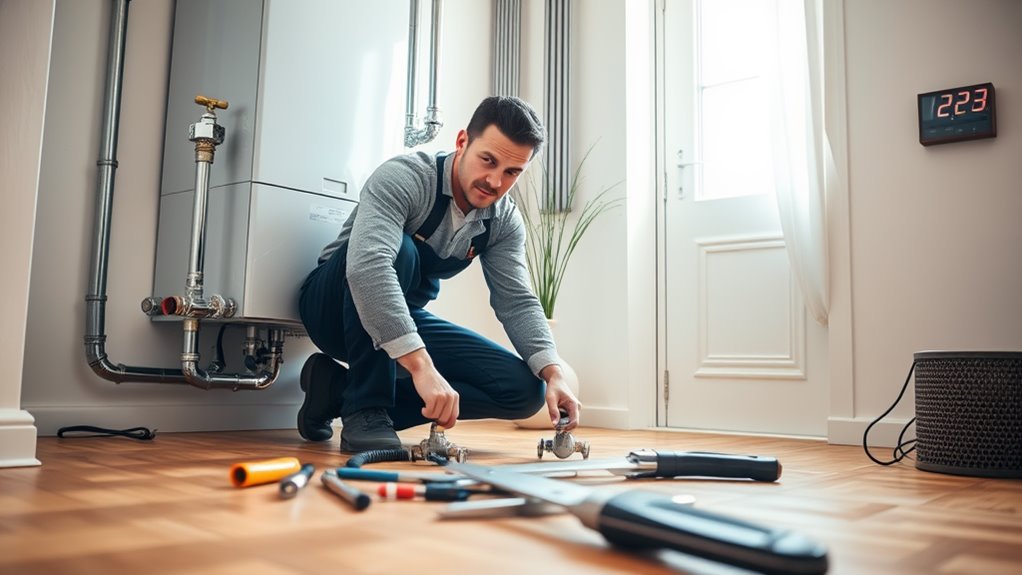Yes, a boiler can often be installed in a single day, but it depends on the type of boiler and the existing heating system's condition. Combi boilers typically require less space and fewer connections, streamlining the process. However, complications like outdated components or plumbing adjustments can extend the timeline. It's vital to prepare the installation area and guarantee you have a qualified professional to manage the installation efficiently. There's more to know about making the right choice for your home.
Key insights
- Most new boiler systems can be installed within a single day by professional installers.
- Installation time may vary based on the type of boiler and existing heating system conditions.
- Clear communication with the homeowner helps align expectations regarding the installation timeline.
- Preparing the area and ensuring unobstructed access can expedite the installation process.
- Professional installers ensure compliance with safety regulations, minimizing risks and potential delays.
Understanding Boiler Types and Their Installation Requirements
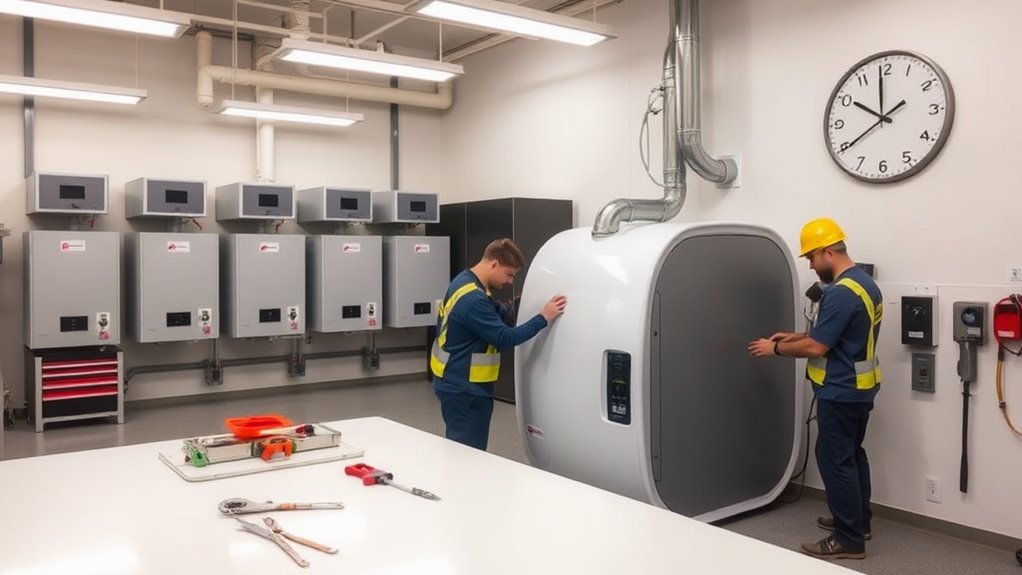
When you're considering boiler installation, understanding the various types of boilers and their specific installation requirements is vital. There are several boiler types, including combi, system, and regular boilers, each designed for different heating needs. Combi boilers are compact and ideal for smaller spaces, while system boilers require a hot water cylinder, making them suitable for larger homes. Regular boilers, on the other hand, need a cold water storage tank and are often used in traditional heating systems. Installation requirements vary considerably; for instance, combi boilers typically need less space and fewer pipe connections than their counterparts. It's important to assess your home's layout and heating demands to select the right boiler type and adhere to the necessary installation requirements. Additionally, compliance with local building codes is crucial to ensure safe and legal installation practices.
Factors Influencing Installation Time

When planning your boiler installation, the type of boiler you choose plays a significant role in the time required for the process. Additionally, the condition of your existing system can either expedite or complicate the installation. Understanding these factors will help you set realistic expectations for your timeline. Regular servicing ensures safe and efficient operation, which can also influence the ease of installation if the existing system is well-maintained.
Boiler Type Selection
Which boiler type you choose can greatly impact your installation time. High-efficiency boilers often require more complex setups and additional components, which can extend the installation process. On the other hand, standard models may offer quicker installation due to their simpler design. It's crucial to contemplate boiler compatibility with your existing system; mismatched components can lead to delays and complications. If you opt for a combi boiler, factors like plumbing adjustments and electrical requirements can also influence the timeline. Ultimately, a thorough assessment of your needs and conditions will assist in selecting the right boiler type. Prioritize both boiler efficiency and compatibility to guarantee a smoother installation process, keeping your project on track. Regular maintenance of the boiler system is essential to ensure energy efficiency and prevent future complications.
Existing System Condition
The condition of your existing heating system plays an essential role in determining installation time for your new boiler. If your current boiler is outdated, its age might complicate the installation process. An older system often requires additional modifications to accommodate modern technology, which can prolong the timeline. Additionally, evaluating system compatibility is vital. If your existing pipes, radiators, or controls aren't compatible with the new boiler, you'll face delays as adjustments must be made. In some cases, it may even necessitate replacing other components, further extending the installation duration. To minimize delays, it's advisable to have a professional evaluate your existing system before proceeding with the new installation. This proactive approach guarantees a smoother shift and quicker installation. Furthermore, ensuring compliance with safety regulations is crucial to avoid potential issues during the installation process.
Assessing Your Current Heating System
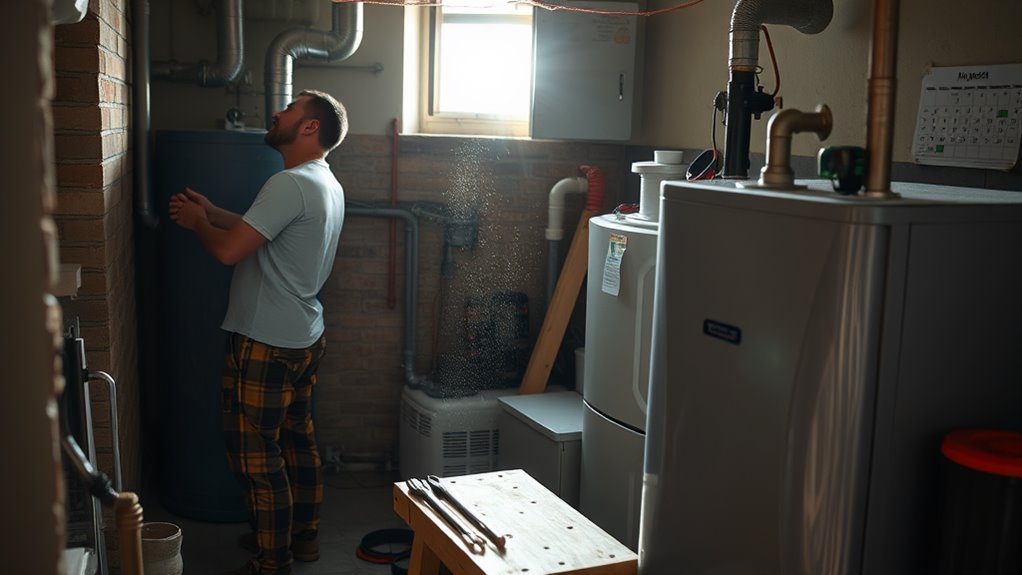
To assess your current heating system, start by evaluating its efficiency to determine how well it meets your heating needs. Next, identify any existing issues that might hinder performance, such as leaks or outdated components. This evaluation will provide a clear picture of what improvements your system may require. Regular monitoring of pressure levels can help identify potential issues like low water pressure that may affect boiler performance.
Evaluate System Efficiency
How efficiently is your current heating system performing? Conducting an efficiency evaluation can reveal critical insights into your system performance. Here are some key factors to take into account:
- Energy bills: Review recent bills to identify any unexpected increases.
- Heat distribution: Check if certain areas of your home are colder than others.
- Age of the system: Older systems typically operate less efficiently.
- Maintenance history: Regular maintenance impacts overall efficiency considerably.
Assessing these elements can help you pinpoint areas for improvement. Understanding your system's efficiency will enable you to make informed decisions about potential upgrades, ensuring that you maintain ideal heating without unnecessary energy waste. Additionally, ensuring compliance with commercial gas safety standards can enhance the overall safety and efficiency of your heating system.
Identify Existing Issues
Identifying existing issues in your heating system is essential for ensuring ideal performance and comfort. Begin with an existing system evaluation to pinpoint inefficiencies, leaks, or other problems that could hinder your boiler's effectiveness. Look for signs of wear and tear, unusual noises, or fluctuating temperatures, as these may indicate underlying faults. Additionally, consider potential installation obstacles such as inadequate space, outdated piping, or improper ventilation, which can complicate the replacement process. Addressing these issues upfront will not only streamline the installation but also enhance the overall functionality of your new boiler. By thoroughly evaluating your current heating system, you can make informed decisions, ultimately leading to improved energy efficiency and cost savings in the long run. Moreover, identifying specific error codes during your assessment can provide crucial insights into existing problems that may need immediate attention.
Choosing the Right Boiler for Your Home
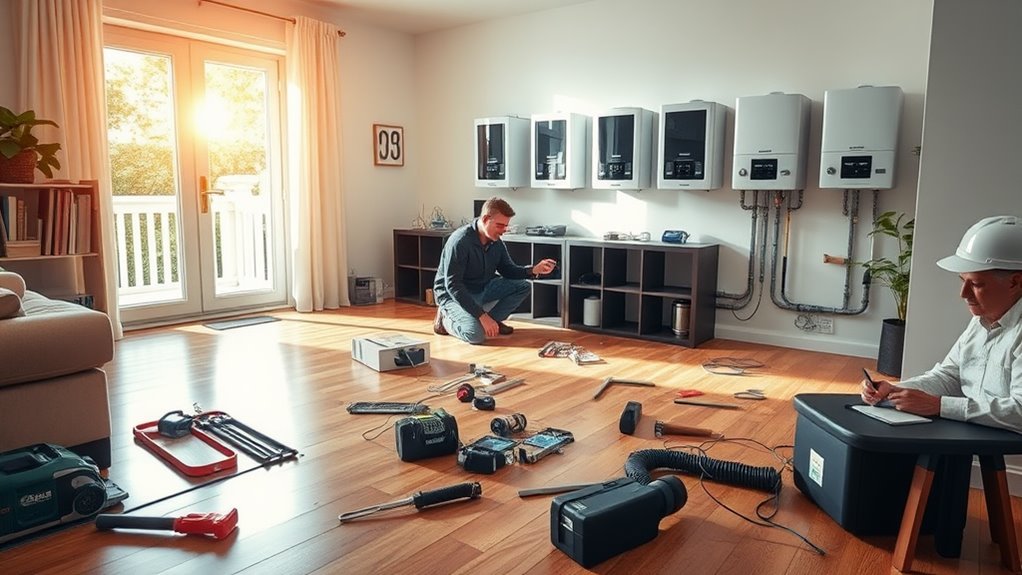
Selecting the right boiler for your home is essential for efficiency and comfort. To make an informed decision, consider the following factors:
- Boiler Type: Choose between combi, system, or conventional boilers based on your needs.
- Boiler Efficiency: Look for models with high energy ratings to save on utility bills.
- Installation Costs: Factor in both the purchase price and installation expenses to stay within budget.
- Space Requirements: Confirm your chosen boiler fits well within your home's layout.
- Environmental Impact: Consider opting for energy-efficient heating systems, such as heat pumps, which can significantly reduce your carbon footprint compared to traditional boilers.
The Installation Process: What to Expect
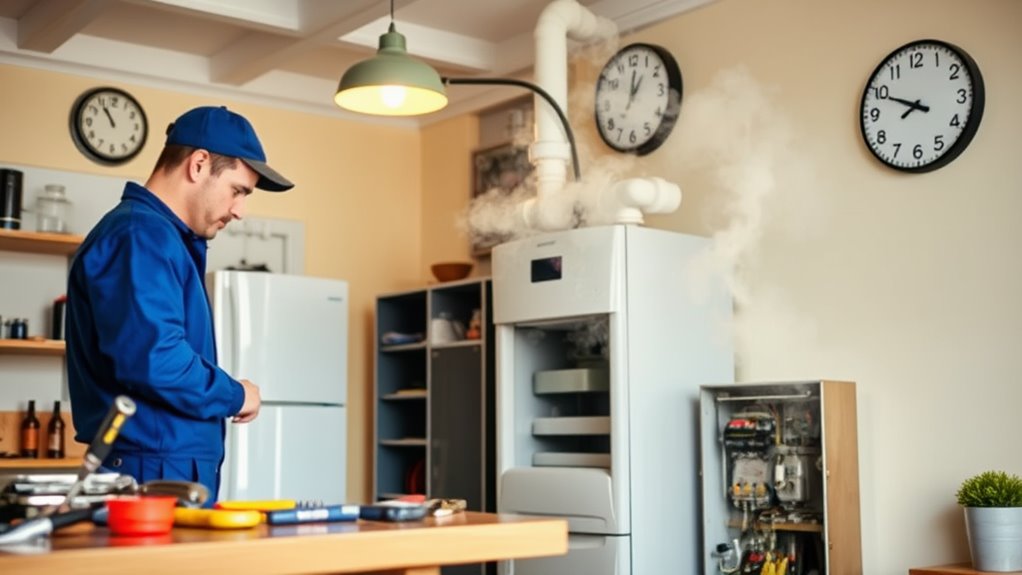
When you schedule a boiler installation, you can expect a structured process that guarantees efficiency and safety. The installation typically begins with a detailed assessment of your home's existing system and infrastructure. This initial evaluation helps technicians outline the installation timeline, making sure they allocate sufficient time for each phase of the project.
You can expect the team to remove your old boiler, prepare the installation site, and carefully install the new system, often within a single day. Throughout this process, clear communication is essential, as it aligns with homeowner expectations regarding timelines and potential disruptions. By staying informed, you can facilitate a smoother installation experience, minimizing any inconvenience while optimizing the performance of your new boiler. Regular maintenance and servicing can also help ensure optimal performance and longevity of your new system.
Preparing Your Home for Installation Day
How can you guarantee a smooth boiler installation day? By completing essential pre-installation preparations, you make certain the process is efficient. Use this installation checklist to help you get ready:
- Clear the area around your current boiler.
- Ensure easy access to your home for the installation team.
- Make arrangements for pets and children to stay out of the work zone.
- Verify that all necessary permits are in place.
These steps not only create a safe environment but also minimize delays. Taking time to prepare your home will enable the installers to focus on their work, making certain that your new boiler is installed correctly and promptly. Proper preparation is key to a successful installation experience. Additionally, ensuring your heating system is in good condition can prevent frequent boiler breakdowns, which may lead to complications during installation.
The Role of Professional Installers
Although you might be tempted to evaluate a DIY approach, the expertise of professional installers is essential for a successful boiler installation. These qualified technicians possess professional qualifications that guarantee compliance with safety regulations and local codes. Their installer expertise allows them to assess your home's specific requirements, ensuring ideal placement and efficiency of the boiler. They're trained to handle intricate systems and potential challenges, which minimizes the risk of errors that could lead to costly repairs or safety hazards. By relying on their skills, you not only save time but also gain peace of mind knowing the installation meets industry standards. Ultimately, hiring a professional installer guarantees a seamless process, allowing you to enjoy your new boiler without unnecessary complications.
Common Challenges During Installation
While installing a boiler may seem straightforward, several common challenges can arise during the process. You might encounter installation complications that delay your project or lead to unforeseen repairs. Being aware of these issues can help you prepare:
- Inaccurate measurements can lead to improper fitting.
- Old piping systems may require upgrades or replacements.
- Code compliance issues can necessitate additional work.
- Unexpected leaks may emerge during the installation.
These challenges can extend the installation timeline and increase costs. By anticipating these potential problems, you can work with your installer to mitigate risks and guarantee a smoother installation experience. Proper planning and professional assistance are essential to navigate these common hurdles effectively.
Benefits of a Quick Installation
When you opt for a quick boiler installation, you streamline the process and minimize disruption to your daily routine. One of the primary quick installation benefits is the immediate restoration of heating and hot water, vital for comfort. This efficient approach also offers time-saving advantages, allowing you to get back to your normal activities without prolonged interruptions. Additionally, shorter installation times often mean lower labor costs, making it a financially savvy choice. You'll benefit from less downtime, which can be critical during colder months. Furthermore, quick installations typically involve fewer complications, reducing the chances of delays. Overall, the swift setup not only enhances convenience but also guarantees you enjoy your new boiler's benefits sooner rather than later.
Post-Installation Considerations and Maintenance
After your boiler installation, establishing a regular maintenance schedule is essential to guarantee peak performance. You'll also want to be aware of common post-installation issues that could arise, as well as energy efficiency tips to maximize your system's effectiveness. Addressing these considerations promptly can enhance longevity and reliability.
Regular Maintenance Schedule
To guarantee your boiler operates efficiently and safely, establishing a regular maintenance schedule is crucial right after installation. Regular inspections not only extend the lifespan of your system but also enhance its performance. Here are some key maintenance benefits you'll experience:
- Improved Efficiency: Regular maintenance guarantees peak performance, reducing energy costs.
- Early Problem Detection: Routine inspections help identify potential issues before they escalate.
- Safety Assurance: Regular checks minimize risks associated with leaks or malfunctions.
- Warranty Compliance: Many warranties require proof of maintenance to remain valid.
Common Post-Installation Issues
Even with a well-planned boiler installation and a solid maintenance schedule in place, various post-installation issues can arise that require your attention. One common problem is boiler leaks, which may stem from loose fittings or worn seals. Detecting leaks early can prevent further damage and costly repairs. Additionally, you might experience pressure fluctuations that can affect system efficiency. These fluctuations can result from air trapped in the system, faulty pressure relief valves, or issues with the expansion tank. Regularly check the pressure gauge and address any irregularities immediately. By staying vigilant about these potential issues, you can guarantee your boiler operates smoothly and efficiently, prolonging its lifespan and maintaining your home's comfort.
Energy Efficiency Tips
While ensuring your boiler operates efficiently, it is crucial to implement energy-saving practices that can reduce utility costs and enhance system performance. Adopt these energy-saving habits and consider insulation improvements to maximize your boiler's effectiveness:
- Schedule regular maintenance checks to keep your system in peak condition.
- Insulate pipes and the boiler itself to prevent heat loss.
- Install a programmable thermostat to better control heating schedules.
- Seal any drafts in windows and doors to maintain consistent indoor temperatures.
Frequently Asked Questions
Can I Install a Boiler Myself to Save Money?
You might consider DIY installation to save money, but it's essential to weigh the risks. Installing a boiler requires technical knowledge of plumbing and gas systems, and improper installation can lead to safety hazards or costly repairs. If you're confident in your skills and understand local codes, you could tackle it yourself, but many people opt for professionals to guarantee compliance and reliability. Ultimately, the potential cost savings need careful consideration against these risks.
What Permits Are Needed for Boiler Installation?
When installing a boiler, you'll need to adhere to specific boiler regulations and installation guidelines. Typically, you'll require a building permit and possibly a plumbing or mechanical permit, depending on your local laws. It's essential to check with your local building authority to guarantee compliance. Failing to obtain the necessary permits can lead to fines and complications, so make sure you've got all the required documentation before starting your installation.
How Can I Prepare My Home for a Boiler Installation?
To prepare your home for a boiler installation, clear the area around the installation site, guaranteeing easy access for technicians. Check existing heating systems for efficiency, and consider boiler maintenance tips to enhance performance. Verify that your home's insulation is adequate, as this can improve home heating efficiency. Finally, confirm there's proper ventilation and that all necessary permits are in place to streamline the installation process and avoid delays.
Are There Any Safety Concerns With Boiler Installation?
When considering boiler installation, you should be aware of several safety concerns. Confirming compliance with installation regulations is essential for boiler safety. This includes proper ventilation, secure fittings, and adhering to manufacturer guidelines. You'll need to check for gas leaks, verify adequate pressure, and install safety valves. Hiring a qualified technician who knows local codes can prevent hazardous situations, guaranteeing your boiler operates efficiently and safely for years to come.
What Warranties Are Available for New Boiler Installations?
When considering new boiler installations, you should explore various boiler warranties available. Most manufacturers offer warranties that cover parts for a specific duration, often ranging from 1 to 10 years, depending on the model. Installation coverage may also be included, ensuring protection against defects or issues arising from improper setup. Always read the warranty details carefully to understand what's covered and any conditions that may apply, ensuring your investment is well protected.
Summary
In summary, while it's possible to install a boiler in a day, various factors can influence the timeline. Understanding your current heating system, choosing the right boiler, and hiring professional installers are essential for a successful installation. Be prepared for potential challenges, and remember that a quick installation doesn't compromise quality. After installation, prioritize maintenance to guarantee your boiler operates efficiently. With careful planning, you can enjoy reliable heating in no time.

